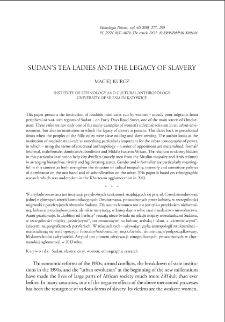- Search in all Repository
- Literature and maps
- Archeology
- Mills database
- Natural sciences
Advanced search
Advanced search
Advanced search
Advanced search
Advanced search

Object
Title: Sudan’s Tea Ladies and the Legacy of Slavery
Subtitle:
Publisher:
Institute of Archaeology and Ethnology Polish Academy of Sciences
Place of publishing:
Description:
Type of object:
Abstract:
This paper presents the institution of roadside mini-cafes run by women – mostly poor migrants from peripheral or war-torn regions of Sudan – on Forty Days Road Street, one of the main streets of Omdurman. These cafes are not only one of the many examples of women’s informal activism in an urban environment, but also an institution in which the legacy of slavery is present. This dates back to precolonial times when the peoples of the Nile valley were slave-raiding and slave-owning. The author looks at the institution of roadside mini-cafe as something particularly important for the urban iconography of power, in which – using the terms of structural anthropology – a series of oppositions are materialised: formal/ informal, male/female, dominant/subordinate and Middle Eastern/African. The relations to slavery hidden in this particular institution help city dwellers (mostly men from the Muslim majority and Arab culture) in arranging hierarchies, rivalry and legitimating status. Gender and informality are particularly meaningful in this context as both strengthen the situation of radical inequality, intensify and constitute politics of dominance on the one hand and of subordination on the other. This paper is based on ethnographic research which was undertaken in the Khartoum agglomeration in 2013.
References:
Amir I. 2013. Identity, Citizenship, and Violence in Two Sudans: Reimagining a Common Future. New York (https://books.google.pl/books?id=zXBtAAAAQBAJ&printsec=frontcover&dq=Idris,+Identity,+Citizenship,+and+Violence+in+Two+Sudans:+Reimagining+a+Common+Future&hl=pl&sa=X&ved=0ahUKEwiy_rvw0aPdAhXDZVAKHeY_CnwQ6AEIKjAA#v=onepage&q= Idris%2C%20Identity%2C%20Citizenship%2C%20and%20Violence%20in%20Two%20Sudans%3A%20Reimagining%20a%20Common%20Future&f=false). Access: 15.09.2018.
Bales K. 1999. Disposable People. New Slavery in Global Economy. Berkley, Los Angeles, London.
Bales K., Trodd Z. A., Williamson K. (eds). 2011. Modern Slavery. A Beginner’s Guide. Oxford (https://books.google.pl/books?id=KQzaU01lLb8C&printsec=froerkley ntcover&dq=Kevin+Bales,+Zoe+Trodd,+Alex+Kent+Williamson+2011&hl=pl&sa=X&ved=0ahUKEwjIgo6Q8KbdAhXLPFAKHfM_AWgQ6AEIJzAA#v=onepage&q=Kevin%20Bales%2C%20Zoe%20Trodd%2C%20Alex%20Kent%20Williamson%202011&f=false). Access: 15.09.2018.
Bales K. 2005. Understanding Global Slavery. A Reader. Berkley, Los Angeles, London.
Barclay W. B. 1964. Buuri al Lamaab: a Buburban Village in the Sudan. N. Y.
Breidlid A., Said A. A., Breidlid A. K. (eds). 2014 (1st ed. 2010). A Concise History of South Sudan. New and Revised Edition. Kampala.
Johnson H. D. 2011 (1st ed. 2003). The Root Causes of Sudan’s Civil Wars. Suffolk.
Jok M. J. 2001. War and Slavery in Sudan. Philadelphia.
Kurcz M. 2007. Za trzecią kataraktą. Poznań, Kraków.
Makris G. P. 2000. Changing Masters: Spirit Possession and Identity Construction among Slave Descendants and other Subordinates in the Sudan. Evanston.
Munzoul A. S. A. 2011. From the Country to the Town. In J. Ryle. J. Willis, S. Baldo, J. M. Jok (eds.), The Sudan Handbook. Suffolk. 63–70.
O’Connell Davidson J. 2015. Modern Slavery. Margins of Freedom. Palgrave Macmillan (https://books.google.pl/books?id=HWekCgAAQBAJ&printsec=frontcover&dq=O%60Connell+Davidson+2015&hl=pl&sa=X&ved=0ahUKEwixlJzh06jdAhXSa1AKHf5TCecQ6AEIJzAA#v=onepage&q=O%60Connell%20Davidson%202015&f=false). Access: 15.09.2018.
Relation:
Volume:
Start page:
End page:
Detailed Resource Type:
Format:
Resource Identifier:
oai:rcin.org.pl:98640 ; 0137-4079 ; doi:10.23858/EthP40.2019.014
Source:
IAiE PAN, call no. P 366 ; IAiE PAN, call no. P 367 ; IAiE PAN, call no. P 368 ; click here to follow the link
Language:
Rights:
Creative Commons Attribution BY-SA 3.0 PL license
Terms of use:
Copyright-protected material. [CC BY-SA 3.0 PL] May be used within the scope specified in Creative Commons Attribution BY-SA 3.0 PL license, full text available at: ; -
Digitizing institution:
Institute of Archaeology and Ethnology of the Polish Academy of Sciences
Original in:
Library of the Institute of Archaeology and Ethnology of the Polish Academy of Sciences
Projects co-financed by:
Operational Program Digital Poland, 2014-2020, Measure 2.3: Digital accessibility and usefulness of public sector information; funds from the European Regional Development Fund and national co-financing from the state budget. ; European Union. European Regional Development Fund
Access:
Object collections:
- Digital Repository of Scientific Institutes > Partners' collections > Institute of Archeology and Ethnology PAS > Institute Publications
- Digital Repository of Scientific Institutes > Partners' collections > Institute of Archeology and Ethnology PAS > Institute Publications > Current Journals
- Digital Repository of Scientific Institutes > Literature > Journals/Articles
- Digital Repository of Scientific Institutes > Partners' collections > Institute of Archeology and Ethnology PAS > Institute Publications > Current Journals > Ethnologia Polona
Last modified:
Feb 2, 2022
In our library since:
Dec 31, 2019
Number of object content downloads / hits:
461
All available object's versions:
https://rcin.org.pl./publication/116699
Show description in RDF format:
Show description in RDFa format:
Show description in OAI-PMH format:
| Edition name | Date |
|---|---|
| Kurcz, Maciej, 2019, Sudan’s Tea Ladies and the Legacy of Slavery | Feb 2, 2022 |
Objects Similar
Kurcz, Maciej
Kurcz, Maciej
Kurcz, Maciej
Małowist, Marian (1909–1988)
Filipczak, Dorota
Kozłowski, Janusz Krzysztof (1936– )
Klichowska, Melania

 INSTYTUT ARCHEOLOGII I ETNOLOGII POLSKIEJ AKADEMII NAUK
INSTYTUT ARCHEOLOGII I ETNOLOGII POLSKIEJ AKADEMII NAUK
 INSTYTUT BADAŃ LITERACKICH POLSKIEJ AKADEMII NAUK
INSTYTUT BADAŃ LITERACKICH POLSKIEJ AKADEMII NAUK
 INSTYTUT BADAWCZY LEŚNICTWA
INSTYTUT BADAWCZY LEŚNICTWA
 INSTYTUT BIOLOGII DOŚWIADCZALNEJ IM. MARCELEGO NENCKIEGO POLSKIEJ AKADEMII NAUK
INSTYTUT BIOLOGII DOŚWIADCZALNEJ IM. MARCELEGO NENCKIEGO POLSKIEJ AKADEMII NAUK
 INSTYTUT BIOLOGII SSAKÓW POLSKIEJ AKADEMII NAUK
INSTYTUT BIOLOGII SSAKÓW POLSKIEJ AKADEMII NAUK
 INSTYTUT CHEMII FIZYCZNEJ PAN
INSTYTUT CHEMII FIZYCZNEJ PAN
 INSTYTUT CHEMII ORGANICZNEJ PAN
INSTYTUT CHEMII ORGANICZNEJ PAN
 INSTYTUT FILOZOFII I SOCJOLOGII PAN
INSTYTUT FILOZOFII I SOCJOLOGII PAN
 INSTYTUT GEOGRAFII I PRZESTRZENNEGO ZAGOSPODAROWANIA PAN
INSTYTUT GEOGRAFII I PRZESTRZENNEGO ZAGOSPODAROWANIA PAN
 INSTYTUT HISTORII im. TADEUSZA MANTEUFFLA POLSKIEJ AKADEMII NAUK
INSTYTUT HISTORII im. TADEUSZA MANTEUFFLA POLSKIEJ AKADEMII NAUK
 INSTYTUT JĘZYKA POLSKIEGO POLSKIEJ AKADEMII NAUK
INSTYTUT JĘZYKA POLSKIEGO POLSKIEJ AKADEMII NAUK
 INSTYTUT MATEMATYCZNY PAN
INSTYTUT MATEMATYCZNY PAN
 INSTYTUT MEDYCYNY DOŚWIADCZALNEJ I KLINICZNEJ IM.MIROSŁAWA MOSSAKOWSKIEGO POLSKIEJ AKADEMII NAUK
INSTYTUT MEDYCYNY DOŚWIADCZALNEJ I KLINICZNEJ IM.MIROSŁAWA MOSSAKOWSKIEGO POLSKIEJ AKADEMII NAUK
 INSTYTUT PODSTAWOWYCH PROBLEMÓW TECHNIKI PAN
INSTYTUT PODSTAWOWYCH PROBLEMÓW TECHNIKI PAN
 INSTYTUT SLAWISTYKI PAN
INSTYTUT SLAWISTYKI PAN
 SIEĆ BADAWCZA ŁUKASIEWICZ - INSTYTUT TECHNOLOGII MATERIAŁÓW ELEKTRONICZNYCH
SIEĆ BADAWCZA ŁUKASIEWICZ - INSTYTUT TECHNOLOGII MATERIAŁÓW ELEKTRONICZNYCH
 MUZEUM I INSTYTUT ZOOLOGII POLSKIEJ AKADEMII NAUK
MUZEUM I INSTYTUT ZOOLOGII POLSKIEJ AKADEMII NAUK
 INSTYTUT BADAŃ SYSTEMOWYCH PAN
INSTYTUT BADAŃ SYSTEMOWYCH PAN
 INSTYTUT BOTANIKI IM. WŁADYSŁAWA SZAFERA POLSKIEJ AKADEMII NAUK
INSTYTUT BOTANIKI IM. WŁADYSŁAWA SZAFERA POLSKIEJ AKADEMII NAUK


































